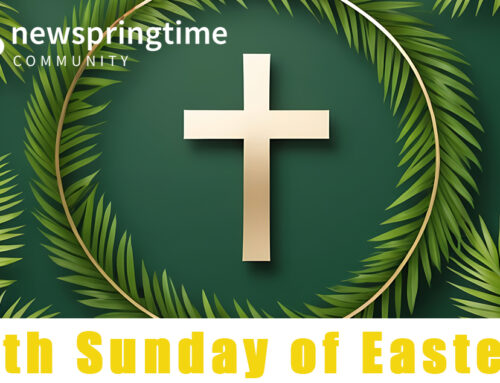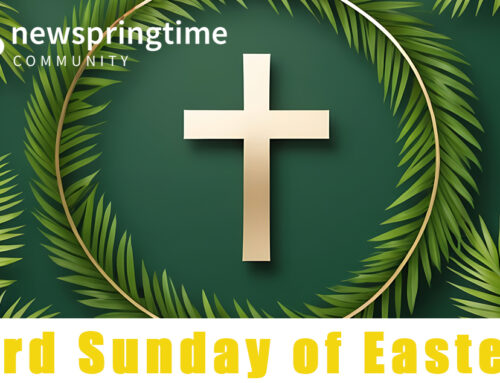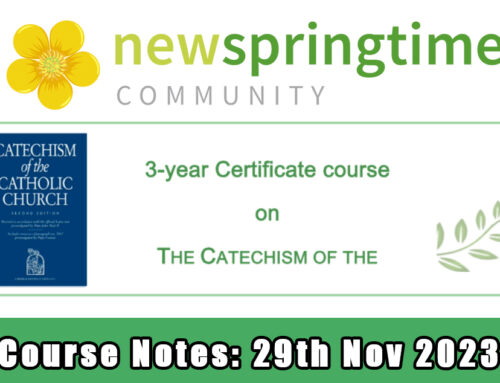The Catechism of the Catholic Church – 21st January 2024
If you would like to download a copy of this notes in PDF, please click here.
Commentary 4th Sunday Ordinary Time B
Although the formative years of Jesus’ life were spent in Nazareth, he moved to Capernaum to engage in his public ministry. It was a fishing village which was established during the time of the Hasmoneans, located on the northern shore of the Sea of Galilee. It had a population of about 1,500 in the 1st century AD. it was reported to have been the hometown of the tax collector Matthew, and located not far from Bethsaida, the hometown of the apostles Simon Peter, Andrew, James, and John. It was a good location for the ministry of Jesus because roads radiated from the town to many locations in Israel. We are told that on a particular Sabbath Jesus entered the local synagogue to teach as a respected layman. The synagogue in Capernaum today consists of the remains of the 4th cent building which replaced the original synagogue. We are told that the people were astonished by the authoritative way in which Jesus spoke which was so unlike the way the Scribes spoke. This raises the question, where did Jesus get such authority? It was the authority that is born of direct experience of God and God’s word. Jesus the new Moses talked to his Father face to face, e.g., at the times he covered his head with his tallit (i.e., his prayer shawl or “little tent”). He was overshadowed by the Spirit. Not only did Jesus talk to his Father, God spoke to him. As he attested in Jn 12:49, “I have not spoken on my own authority, but the Father who sent me has himself given me a commandment—what to say and what to speak.” On another occasion he testified in Jn 5:19-20, “Most assuredly, I say to you, the Son can do nothing of Himself, but what He sees the Father do; for whatever He does, the Son also does in like manner. For the Father loves the Son and shows Him all things that He Himself does.” In Acts 3:22, St Peter observed that in speaking and acting in the way he did, Jesus fulfilled an Old Testament prophecy in Deut 18:15, “For Moses said, ‘The Lord your God will raise up for you a prophet like me from among your own people; you must listen to everything he tells you.”
Then we are told that a man afflicted by evil spirits was present. I suspect that by mentioning this fact Mark was intimating that the devil was the one who had tempted Adam and Eve to commit the original sin of disobedience which led to the disruption of God’s plan for the complete harmony of humans, with one another, creation, and God. That harmony has been disrupted not only by original sin but also by the sins of all humans, apart from Mary the mother of God. Jesus came to proclaim the coming of the kingdom of God, i.e., the restoration of the harmony God had intended by defeating the devil and forgiving sin. So, when Jesus exorcised the man in the synagogue it was his good news proclamation in action. As St Paul was to say many years later, “God’s kingdom isn’t just a lot of words. It is power” (1 Cor 4:20) and “my speech and my preaching was not with enticing words of man’s wisdom, but in demonstration of the Spirit and of power” (1 Cor 2:4). What is really striking about this incident is the fact that although the disciples and the Jewish authorities often heard Jesus speak and witnessed his deeds of power, they failed to recognize who Jesus was, unlike the evil spirits who cried out “What have you to do with us, Jesus of Nazareth? Have you come to destroy us? I know who you are—the Holy One of God! “What Mark was implying was that yes indeed; Jesus had come to destroy the devil’s reign by means of his saving death and resurrection. Surely, the fact that this is the first deed of power recorded by Mark is significant and foundational. No wonder the witnesses to what Jesus had said and done were deeply impressed by his unique authority and power. It seems to me that we have here the paradigm of what effective evangelization has to be like.
Firstly, evangelisers, like Jesus, receive guidance in the course of their prayer about what they are to say and do.
Secondly, they proclaim the good news about the reign of God over the powers of evil.
Thirdly, they demonstrate that truth by means of deeds of power. It is significant in the light of what we have noted, that before his ascension, Jesus said in Mark’s Gospel, “Go throughout the whole world and preach the gospel to the whole human race. Whoever believes and is baptized will be saved; whoever does not believe will be condemned. Believers will be given the power to perform miracles: they will drive out demons in my name; they will speak in strange tongues” (Mk 16:15-17).





